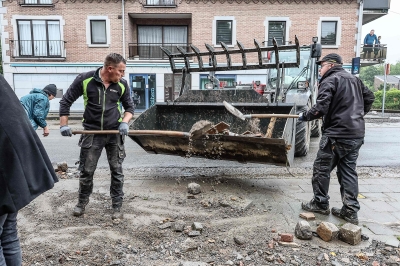
Lithuania's President Gitanas Nauseda shakes hands with Ukraine's President Volodymyr Zelenskiy in Vilnius, Lithuania January 10, 2024. — Reuters pic
Join us on our WhatsApp Channel, follow us on Instagram, and receive browser alerts for the latest news you need to know.
Wednesday, 10 Jan 2024 9:23 PM MYT
VILNIUS, Jan 10 — Ukrainian President Volodymyr Zelensky arrived in Lithuania today on an unannounced visit to staunch Baltic allies as he seeks to bolster wavering support among other Western backers.
The tour of the three former Soviet republics — which are now EU and Nato members — marks Zelensky’s first official trip abroad this year.
“Estonia, Latvia, and Lithuania are our reliable friends and principled partners. Today, I arrived in Vilnius before going to Tallinn and Riga,” Zelensky said on X, formerly Twitter.
Advertisement
“Security, EU and Nato integration, cooperation on electronic warfare and drones, and further coordination of European support are all on the agenda,” he added.
Ukraine has come under intense Russian shelling in recent weeks, retaliating with strikes on Russia’s border city of Belgorod, as Moscow’s invasion nears its second anniversary.
Zelensky has urged allies to keep military support flowing and held in-person talks with officials from the United States, Germany and Norway last month.
Advertisement
But an EU aid package worth €50 billion (RM255 billion) has been stuck in Brussels following a veto by Hungary, while the US Congress remains divided on sending additional aid to Ukraine.
Following the escalation in aerial attacks on Ukraine, Lithuanian President Gitanas Nauseda called on allies to deliver additional air defence systems to Kyiv.
“Ukrainians do wonders with the air defence the West has provided, but they need more,” Nauseda wrote last week on X.
Lithuania is the biggest donor to Ukraine in terms of GDP, according to the German-based Kiel Institute for the World Economy.
The Baltic state has earmarked government support amounting to nearly 1.4 per cent of its GDP, Kiel’s Ukraine aid tracker showed.
Estonia and Latvia were ranked in second and fifth place, with aid committed totalling 1.3 and 1.1 per cent of GDP.
‘Crucial times’
Estonian Foreign Minister Margus Tsahkna said Tallinn was ready “to allocate 0.25 per cent of its GDP to military aid to Ukraine” over the next four years.
“It’s way cheaper to support Ukraine now compared to the price the international community would have to pay if Russia would reach the goals of this merciless aggression,” Tsahkna said on X on Sunday.
Estonian Prime Minister Kaja Kallas said today in a government press release that “we must support Ukraine as long as it is needed”.
“These are crucial times, and we need to keep our focus,” she added.
Latvian Defence Minister Andris Spruds said last week that Riga was committed to “continuously” provide military equipment and training for Ukrainian soldiers and expand the drone coalition.
According to the Latvian defence ministry, the Baltic state trained around 3,000 Ukrainian troops last year.
Zelensky last visited Vilnius for a Nato summit in July, where he secured promises of unwavering support to Kyiv from Western leaders including US President Joe Biden.
But fresh Russian attacks on critical infrastructure and residential neighbourhoods has prompted Kyiv to urge speedier weapons shipments in order to boost its military capabilities.
“We agreed on the importance of strengthening Ukrainian air defence,” Zelensky’s chief of staff, Andriy Yermak, said last week following talks with White House National Security Advisor Jake Sullivan.
Aid promised to Ukraine between August and October 2023 fell almost 90 per cent from the same period in 2022, reaching its lowest point since the start of the war, according to a Kiel Institute survey from December.
“The outlook is unclear, since the largest pending aid commitment — by the European Union — has not been finally approved, and aid by the US has been on the decline,” the institute said. — AFP

.png) 4 months ago
4 months ago
















 English (US) ·
English (US) ·